Comprehensive Guide to Garden Maintenance in Clapham
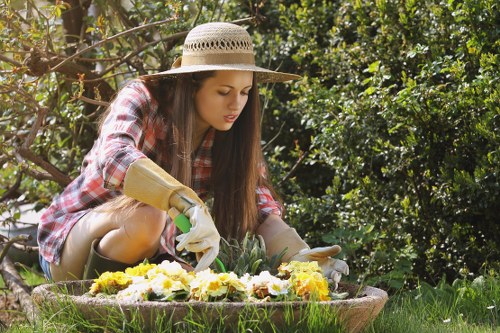
Introduction to Garden Maintenance
Maintaining a garden in Clapham requires a combination of **dedication**, **knowledge**, and the right tools. Whether you're a seasoned gardener or a beginner, understanding the local climate and soil conditions is crucial for a thriving garden.
Clapham's unique environment offers both opportunities and challenges for garden enthusiasts. From the mild winters to the warm summers, each season presents different maintenance tasks that ensure your garden remains vibrant and healthy throughout the year.
In this article, we'll explore the essential aspects of garden maintenance in Clapham, offering practical tips and strategies to help you achieve a picturesque and well-kept garden.
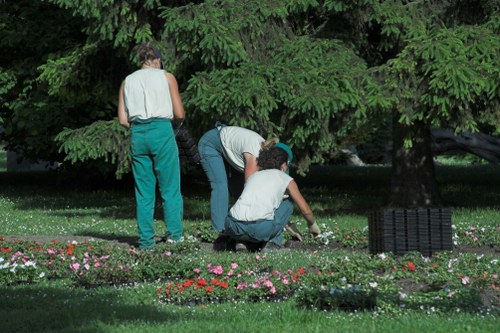
Understanding Clapham's Climate
Clapham enjoys a temperate maritime climate, characterized by mild winters and warm summers. This climate is ideal for a variety of plants, but it also means gardeners need to be mindful of specific seasonal changes.
Spring is a time of renewal, with plants emerging and lawns beginning to grow. Regular watering and fertilizing are essential during this period to support new growth.
During the summer months, increased temperatures may require more frequent watering and shading for sensitive plants. Additionally, controlling pests becomes a priority to prevent damage.
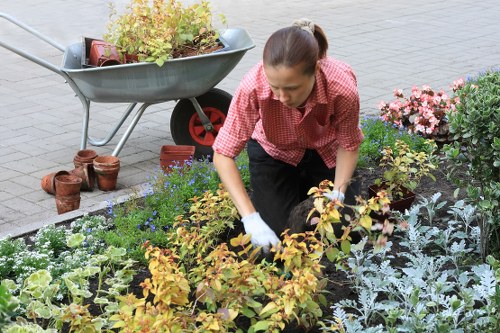
Seasonal Maintenance Tasks
Spring Gardening
Spring is the perfect time to prepare your garden for the growing season. Start by clearing any debris from winter and inspecting plants for damage.
Planting new flowers and vegetables should be done after the last frost. Mulching helps retain moisture and suppress weeds.
Pruning shrubs and trees ensures healthy growth and maintains the desired shape of your plants.
Essential Spring Tools:
- Pruning shears
- Garden gloves
- Rake and hoe
- Watering can or hose
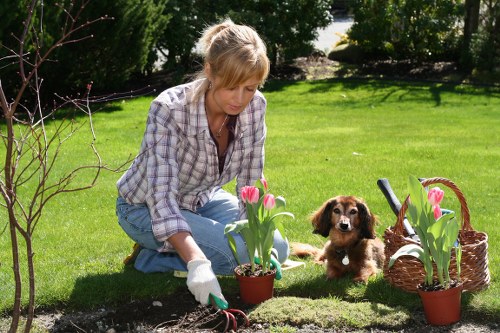
Summer Care and Maintenance
Watering Strategies
During the summer, consistent watering is vital. Early morning is the best time to water to reduce evaporation and fungal growth.
Using drip irrigation systems can save water and ensure plants receive adequate moisture without overwatering.
Mulching again plays a significant role in conserving moisture and keeping the soil temperature stable.
Common Summer Pests:
- Aphids
- Slugs and snails
- Whiteflies
- Spider mites
Tips to Control Pests:
Introduce natural predators like ladybugs and lacewings. Use organic pesticides when necessary, and maintain plant health to resist infestations.
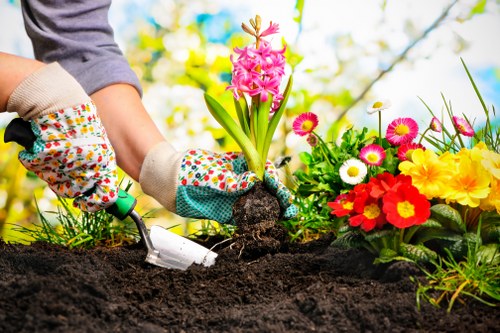
Autumn and Winter Preparation
Preparing for Cooler Months
As the weather cools, it's essential to prepare your garden for the upcoming winter. Remove spent plants and deadheading helps prevent the spread of diseases.
Protecting perennials and sensitive plants with mulch or frost cloths can shield them from frost damage.
Regularly clean and store garden tools to prolong their lifespan and ensure they're ready for the next gardening season.
Winter Maintenance Tips:
- Trim back perennials after the first frost.
- Drain and store hoses and watering systems.
- Check for and repair any garden infrastructure.
- Plan your garden layout for the next year.
By following these steps, you can ensure that your garden remains healthy and resilient, even during the colder months.
Choosing the Right Plants for Clapham
Selecting plants that thrive in Clapham's climate is key to successful garden maintenance. Consider native species as they are well-adapted to local conditions and require less maintenance.
Some popular choices include:
- Lavender
- Roses
- Hostas
- Hydrangeas
- Heathers
Incorporating a mix of evergreen and deciduous plants ensures year-round interest and structure in your garden.
Perennials vs. Annuals
Perennials provide long-term structure and require less frequent planting, while annuals offer vibrant, seasonal color. A balanced garden includes both types to maximize visual appeal and functionality.
Benefits of Native Plants:
- Low maintenance
- Resilient to local pests and diseases
- Support local wildlife
- Adapted to local soil and climate
Lawn Care in Clapham
A well-maintained lawn enhances the overall aesthetic of your garden. Regular mowing, aeration, and fertilization are essential for a healthy turf.
Clapham's grass types, such as Ryegrass and Fescues, thrive in moist conditions, making proper drainage important to prevent waterlogging.
Addressing common lawn issues like weeds, pests, and diseases promptly ensures a lush and vibrant lawn.
Mowing Tips:
Set your mower to the correct height to encourage strong root growth. Avoid cutting more than one-third of the grass blade at a time to prevent stress.
Fertilization Schedule:
- Early Spring: Apply a balanced fertilizer to support new growth.
- Late Spring: Follow up with a nitrogen-rich fertilizer.
- Fall: Use a slow-release fertilizer to strengthen roots for winter.
Soil Health and Improvement
Healthy soil is the foundation of a thriving garden. Testing your soil's pH and nutrient levels helps you understand what amendments are needed.
Adding organic matter like compost improves soil structure, drainage, and fertility. Regularly amending your soil ensures that plants receive the necessary nutrients.
Implementing crop rotation and green manure can prevent soil depletion and reduce pest and disease buildup.
Soil Testing:
Conduct a soil test annually to monitor nutrient levels and pH balance. Adjust your soil accordingly with lime to raise pH or sulfur to lower it.
Organic Amendments:
- Compost
- Manure
- Bone meal
- Blood meal
- Fish emulsion
Pruning and Trimming Techniques
Regular pruning promotes healthy growth and maintains the desired shape of your plants. Understanding the specific needs of each plant species is essential.
Pruning should be done at the correct time of year to avoid damaging plants. For instance, prune spring-flowering shrubs immediately after flowering.
Using the right tools, such as sharp pruners and loppers, ensures clean cuts that minimize the risk of disease.
Types of Pruning:
- Thinning: Removing entire branches to increase light and air penetration.
- Heading: Cutting back to a bud to encourage bushier growth.
- Shearing: Trimming for shape, commonly used on hedges.
Pruning Tips:
- Always sterilize tools before use.
- Cut at a 45-degree angle to promote healing.
- Remove dead or diseased wood first.
- Do not over-prune; maintain the natural form of the plant.
Mulching for a Healthier Garden
Mulching is an effective way to conserve moisture, suppress weeds, and regulate soil temperature. It also adds aesthetic value to your garden beds.
Organic mulches, such as bark, straw, and compost, enrich the soil as they decompose. Inorganic mulches like gravel and black plastic are longer-lasting and require less maintenance.
Apply a 2-3 inch layer of mulch around plants, keeping it a few inches away from stems and trunks to prevent rot and disease.
Benefits of Mulching:
- Reduces water evaporation
- Prevents weed growth
- Improves soil structure
- Enhances soil fertility
- Adds visual appeal
Choosing the Right Mulch:
Select mulch based on your garden needs and aesthetic preferences. Organic mulches are ideal for vegetable gardens, while decorative mulches work well in ornamental beds.
Weed Control Strategies
Weeds compete with your plants for nutrients, water, and sunlight. Effective weed control is essential for maintaining a healthy garden.
Manual weeding, mulching, and the use of natural herbicides are eco-friendly methods to manage unwanted plants.
Implementing preventative measures, such as landscape fabric or pre-emergent herbicides, can reduce weed growth.
Natural Weed Control:
- Hand pulling
- Boiling water
- Vinegar-based solutions
- Corn gluten meal
Preventative Measures:
- Use mulch to block sunlight.
- Maintain healthy soil to support strong plant growth.
- Regularly inspect and remove weeds early.
- Rotate crops to disrupt weed cycles.
Pest and Disease Management
Protecting your garden from pests and diseases ensures the health and productivity of your plants. Early detection and intervention are key.
Integrated Pest Management (IPM) combines biological, cultural, and chemical controls to manage garden pests sustainably.
Using organic pesticides and encouraging beneficial insects can help maintain a balanced ecosystem in your garden.
Common Garden Pests:
- Aphids
- Snails and slugs
- Caterpillars
- Slugs
- Beetles
Disease Prevention:
Maintain good air circulation, avoid overhead watering, and practice crop rotation to prevent fungal and bacterial diseases.
Organic Remedies:
- Neem oil
- Insecticidal soap
- Garlic and chili sprays
Garden Tools and Equipment
Investing in quality garden tools and equipment makes maintenance tasks easier and more efficient. Regular maintenance of your tools prolongs their lifespan.
Essential tools for garden maintenance in Clapham include:
- Pruning shears
- Spades and forks
- Hoe and rake
- Watering systems
- Lawn mower
Proper storage and cleaning after use prevent rust and damage, ensuring your tools are ready when needed.
Essential Equipment:
- Watering cans or hoses with adjustable nozzles
- Lawn mower with appropriate blade height settings
- Wheelbarrow for transporting materials
- Compost bin for recycling garden waste
- Protective gear, including gloves and goggles
Tool Maintenance Tips:
Regularly sharpen blades, lubricate moving parts, and inspect for wear and tear. Store tools in a dry, sheltered area to prevent damage from the elements.
Sustainable Gardening Practices
Embracing sustainable gardening practices benefits both your garden and the environment. Reducing chemical usage and conserving resources fosters a healthier ecosystem.
Composting kitchen and garden waste recycles nutrients back into the soil, enhancing its fertility naturally.
Using rain barrels to collect rainwater provides an eco-friendly watering solution that conserves water.
Eco-Friendly Techniques:
- Composting
- Rainwater harvesting
- Using organic fertilizers
- Planting native and drought-resistant species
- Implementing crop rotation
Benefits of Sustainable Gardening:
- Reduces environmental impact
- Promotes biodiversity
- Conserves water and resources
- Enhances soil health
- Creates a resilient garden ecosystem
Getting Started:
Begin by assessing your garden's current practices and identifying areas for improvement. Implementing small changes gradually can lead to significant long-term benefits.
Professional Garden Maintenance Services in Clapham
While DIY garden maintenance is rewarding, hiring professional services in Clapham can save time and ensure expert care. Professionals offer tailored solutions based on your garden's specific needs.
Services typically include regular maintenance, seasonal clean-ups, plant selection and installation, and specialized treatments for pests and diseases.
Choosing a reliable garden maintenance service ensures your garden remains beautiful and healthy year-round.
Benefits of Professional Services:
- Expert knowledge and experience
- Time-saving
- Customized maintenance plans
- Access to specialized tools and equipment
- Consistent garden upkeep
Choosing the Right Service:
- Research and read reviews
- Assess their range of services
- Check for qualifications and insurance
- Request quotes and compare prices
- Discuss your specific garden needs
Investing in professional garden maintenance can transform your outdoor space, making it a relaxing and enjoyable area for years to come.
Call to Action:
Contact us today to schedule a consultation and let our experts help you achieve the garden of your dreams in Clapham.
Conclusion
Effective garden maintenance in Clapham involves understanding the local climate, selecting appropriate plants, and adhering to seasonal care routines. Whether you manage your garden yourself or enlist professional help, consistent effort and informed decisions lead to a thriving and beautiful garden.
Embrace the joy of gardening by implementing the tips and strategies outlined in this guide. With dedication and the right approach, your Clapham garden can be a stunning oasis that enhances your home's curb appeal and provides a peaceful retreat.
Book your service now and take the first step towards a healthier, more vibrant garden.

